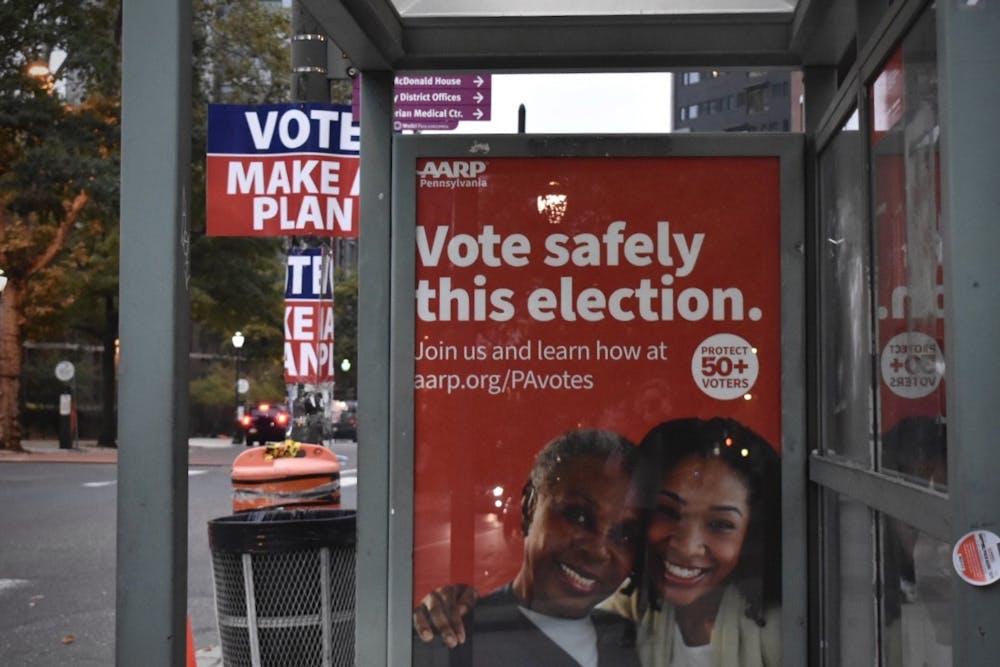
Are bad things really happening at the polls in Philadelphia? According to the leaders of Penn’s on-campus political groups and student poll workers, the answer is no.
Last month, President Donald Trump ended the fall's first presidential debate with a now infamous quote: “As you know, today there was a big problem. In Philadelphia, they went in to watch. They’re called poll watchers, a very safe, very nice thing. They were thrown out. They weren’t allowed to watch. You know why? Because bad things happen in Philadelphia. Bad things.”
Although Trump is concerned about election integrity in Philadelphia, Penn students are not. Instead, student leaders are pointing the finger at the 1968 Wharton graduate himself.
“It’s important to state that Penn Leads the Vote is nonpartisan, but that doesn't mean we're going to not call out lies, and it's just simply false that there has been any sort of major voting fraud,” said College junior and Co-Director of Penn Leads the Vote Harrison Feinman said.
College senior and Penn Democrats President Owen Voutsinas-Klose agreed, calling Trump the biggest threat to election integrity.
"[Trump's] already casting aspersions on the ballot," Voutsinas-Klose said. "He's basically created this partisan divide whereby Democrats vote by mail, as it's the safe thing to do, but all his supporters don’t trust the mail in ballot voting process, so they're all voting in person."
Trump has set the stage for casting doubt on the validity of the election and created a myth often used by Republicans that massive voter fraud will occur in the cities that do not support him, said Voutsinas-Klose. He called Trump’s quote on Philadelphia “racism in its purest form."
"He knows that Philadelphia is a majority Black city. He knows that it's eight to one Democratic. He knows that we don't like him here. He knows that he's not popular here," Voutsinas-Klose said.
He stated that the group will not let any politician discourage students from voting or let them think that their vote isn't safe when they have seen no evidence at this point to indicate that there are any "bad things happening” in terms of election integrity in Philadelphia County.
Last Tuesday, the Trump campaign sued Philadelphia, arguing that poll watchers should have the right to observe what happens at early voting satellite locations, where voters can register to vote, apply for, and submit mail-in ballots in the same visit. U.S. District Judge J. Nicholas Ranjan, who was appointed by Trump, threw this lawsuit out last week.
Voutsinas-Klose said that although poll watchers cannot technically influence the votes, Trump was trying to intimidate city voters by bringing in supporters from his base in the rural parts of the state.
"The intention is there to intimidate voters, but I have a lot of faith in the District Attorney, the Philadelphia police, and the city administration that voters will not be intimidated,” Voutsinas-Klose said.
In an effort to help the city, College sophomore Caleb Shack has organized 12 Penn students to be poll workers on election day. Shack is the Philanthropy chair of his fraternity, Sigma Nu, and has used his platform to unofficially recruit workers.
"Being a part of a frat, you have a decent amount of organizational power, and I felt that this is a good time to use that to better our country and our democracy," Shack said.
This is his first year working at the polls and voting in a presidential election. He felt particularly inclined to volunteer because Philadelphia is facing a critical voter shortage, especially as elderly volunteers cannot work due to COVID-19 risks.
"I'm pretty much native to Philadelphia. I'm from just outside of here, so I've been here my whole life, and I feel like Philadelphia is fine. I don’t think we need people to hover over us and make sure we do our job correctly. The reason we're there is to do our job correctly,” said Shack, echoing Voutsinas-Klose’s confidence in election integrity.
Voutsinas-Klose voted early on Sept. 30 using Philadelphia’s satellite office at City Hall, calling it a “great experience.”
Feinman also called the satellite offices a “great middle ground” because voters do not have to worry about deadlines, the ballot getting lost in the mail, or forgetting to include a secrecy envelope. Feinman said he will vote by mail because it is most convenient for him, but said that members of the club will be voting by a variety of methods, as will members of Penn Dems, according to Voutsinas-Klose.
Both Voutsinas-Klose and Feinman said voters should choose whichever voting method works best for them, but urged mail-in voters to send their ballots in as soon possible to avoid mail delays.
A satellite voting office close to Penn’s campus is set to open soon on 4550 Haverford Avenue at the Alain Locke School. A full list of satellite offices can be found on Penn Leads the Vote website, as well as resources on becoming a poll worker.
The Daily Pennsylvanian is an independent, student-run newspaper. Please consider making a donation to support the coverage that shapes the University. Your generosity ensures a future of strong journalism at Penn.
Donate







